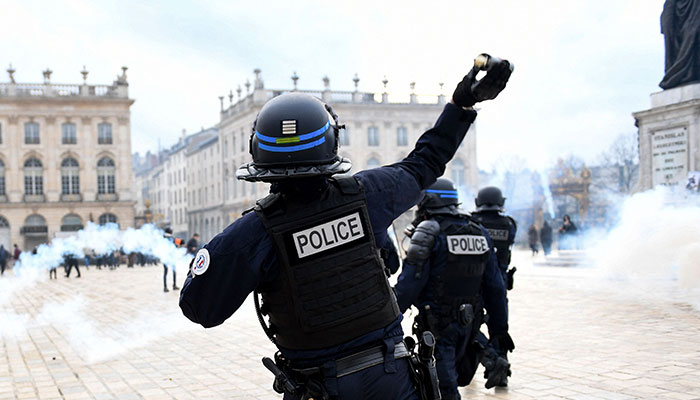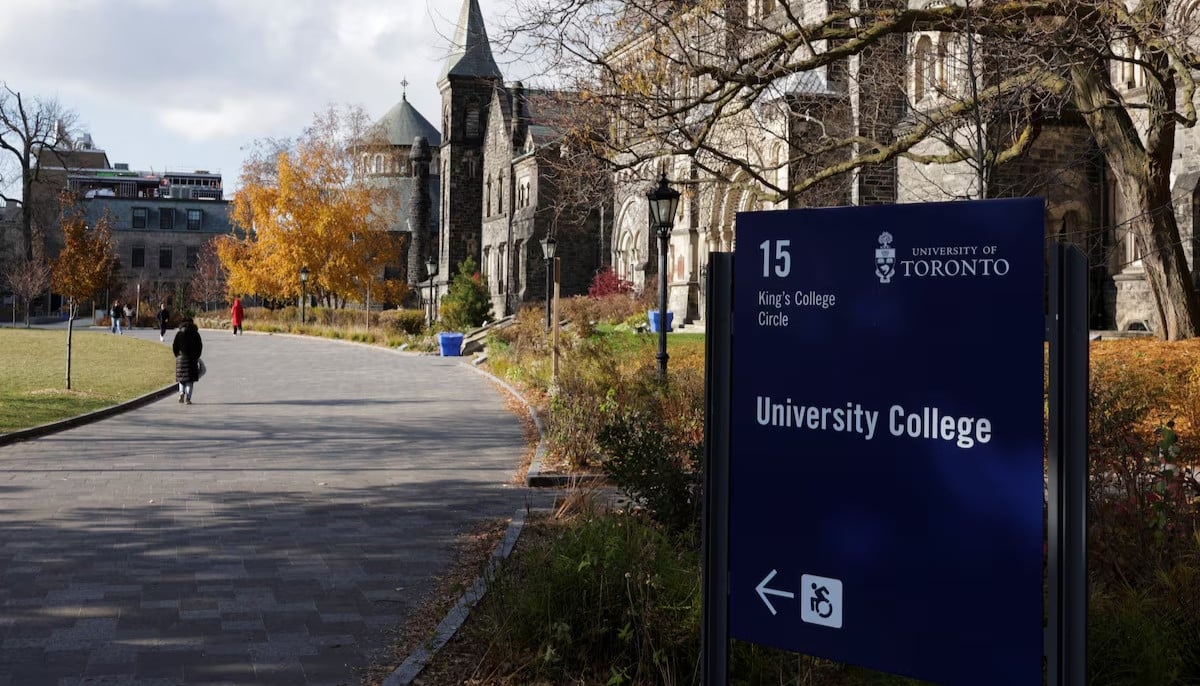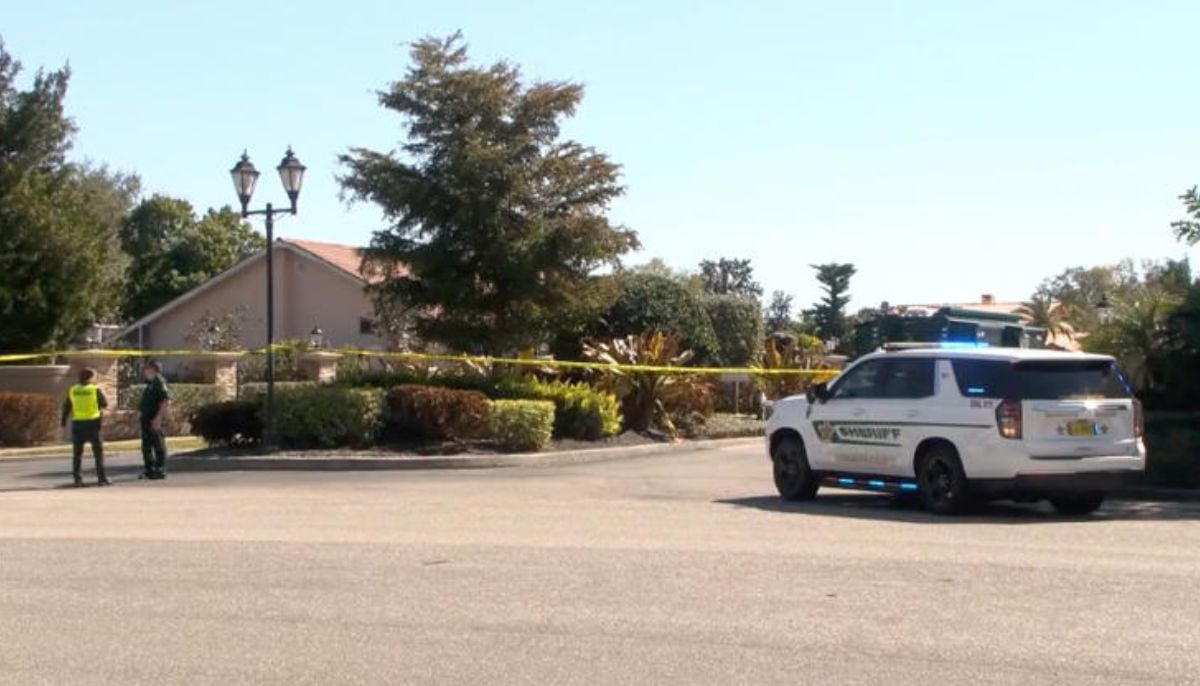French protests turn violent as pensions fury rages
Pension reforms have turned into the biggest domestic crisis of Macron’s second term
PARIS: Hundreds of thousands of French workers on Thursday massed in a new show of anger against President Emmanuel Macron’s pension reform, with protests turning violent in Paris and other cities in a confrontation that shows no sign of abating.
The uproar over the imposition of the reform — which the government chose to push through without a parliamentary vote — has turned into the biggest domestic crisis of Macron’s second term in office.
It also threatens to cast a shadow over next week’s visit to France of King Charles III, the first foreign visit he has made as monarch.
The numbers in Paris and other cities were higher than in previous protest days, the protests have given new momentum by Macron’s refusal in a TV interview Wednesday to back down on the reform.
"I found him very authoritarian. He doesn’t listen," Solange Le Nuz, a 28-year-old engineer protesting in Paris, told AFP.
Police and protesters again clashed on the streets of the capital during a major demonstration, security forces firing teargas and charging crowds with batons.
Some protesters lit fires in the street, setting ablaze pallets and piles of uncollected rubbish, prompting firefighters to intervene, AFP correspondents said.
Some 1.089 million protesters took part in demonstrations across France, the interior ministry said, putting the Paris turnout at 119,000, the highest for the capital since the movement started in January.
The nationwide figure still fell short of the 1.28 million people who marched on March 7, according to government figures.
Unions claimed a record 3.5 million people turned out across France and 800,000 in the capital.
In Paris, several hundred black-clad radical demonstrators were breaking windows of banks, shops and fast-food outlets, and destroying street furniture, AFP journalists witnessed.
Police reported 26 arrests by 6.00 pm (1700 GMT), with those detained suspected mostly of possessing illegal weapons or planning to damage property or commit acts of violence.
An AFP journalist saw paramedics treating one injured demonstrator.
One policeman was injured by a projectile to the head, a police source said.
‘My lover, not my boss’
Unions appealed for peaceful protests. "We need to keep public opinion on our side until the end," said Laurent Berger, leader of the moderate CFDT.
In the western city of Rennes, one protester held up a sign reading: "I want to grow old with my lover, not with my boss."
School teacher Cedric Nothias, 46, held up a sign that read: "How does one teach democracy when Macron is trampling all over it?"
Protesters briefly occupied the tracks at the Gare de Lyon train station in Paris, and some blocked access to Charles de Gaulle airport.
Half of France’s high-speed train services were cancelled, and rubbish is still piled up in the streets of Paris because of stoppages by garbage collectors.
Anger surged after a defiant Macron said on Wednesday he was prepared to accept unpopularity over the pensions reform which he said was "necessary".
A survey on Sunday showed Macron’s personal approval rating at just 28%, its lowest since the anti-government "Yellow Vest" protest movement in 2018-2019.
Excessive force
Acting on Macron’s instructions, Prime Minister Elisabeth Borne last week invoked an article in the constitution to adopt the reform without a parliamentary vote, sparking two no-confidence motions in parliament, which she survived — but one by a narrow margin.
Thursday’s protests were the latest in a string of nationwide stoppages that began in mid-January against the pension changes.
The ministry of the energy transition on Thursday warned that kerosene supply to the capital and its airports was becoming "critical" as blockages at oil refineries continued.
Since the government imposed the reform last Thursday, nightly demonstrations have taken place across France, with young people coordinating their actions on encrypted messaging services.
There have been hundreds of arrests and accusations of heavy-handed tactics by police.
Amnesty International has expressed alarm "about the widespread use of excessive force and arbitrary arrests reported in several media outlets".
Macron said Wednesday that the pension changes needed to "come into force by the end of the year".
Backtracking on earlier comments that the crowds demonstrating had "no legitimacy", he said organised protests were "legitimate", but violence should be condemned and blockages should not impede normal activity.
UK’s King Charles III is due to arrive Sunday for his first foreign state visit as monarch.
French public sector trade unionists have warned they will not provide red carpets during the visit, but non-striking workers are expected to roll them out.
The unions meanwhile have called a fresh day of strikes next Tuesday.
-
Kylie Kelce breaks silence on 'beef' with Dwayne Wade
-
Suspect kills six across Florida before taking his own life
-
Savannah Guthrie shares sweet childhood video with missing mom Nancy: Watch
-
Piers Morgan praised by Ukrainian President over 'principled stance' on Winter Olympics controversy
-
Halsey's fiance Avan Jogia shares rare update on wedding planning
-
Las Vegas father shoots daughter's boyfriend, then calls police himself
-
'Fake' sexual assault report lands Kentucky teen in court
-
Woman arrested months after allegedly staging husband’s murder as suicide












